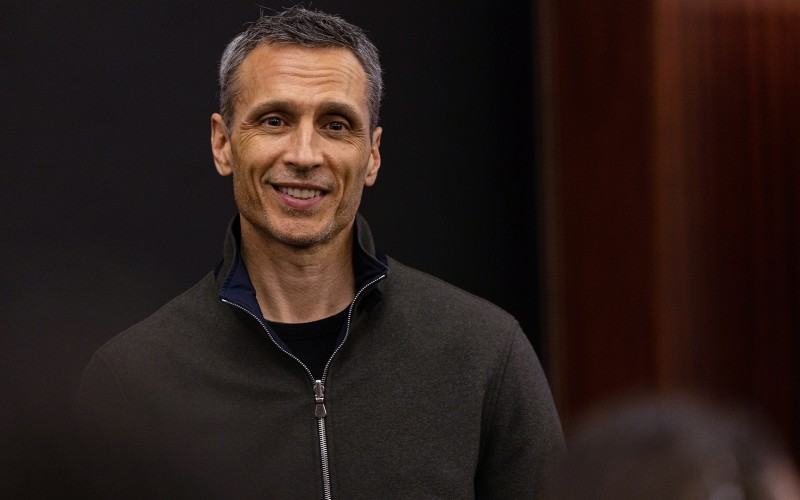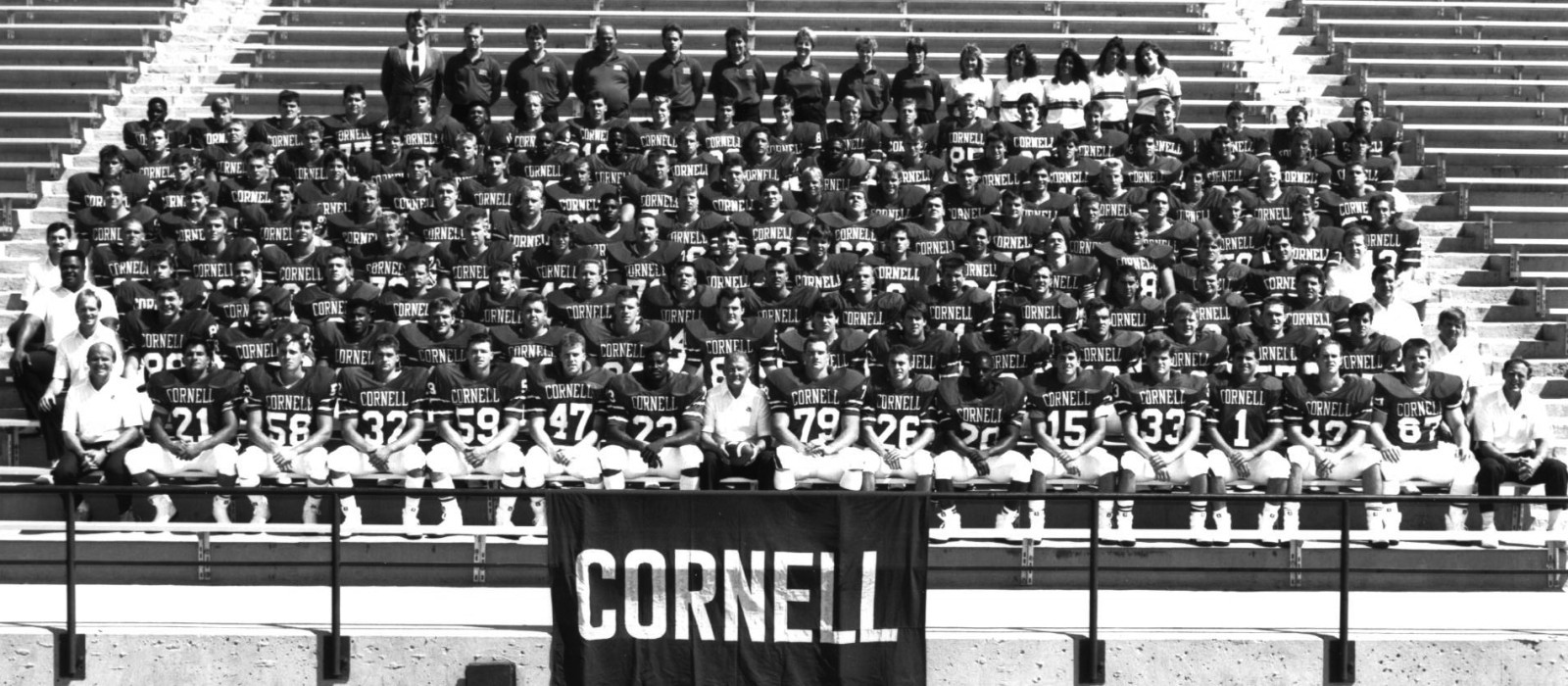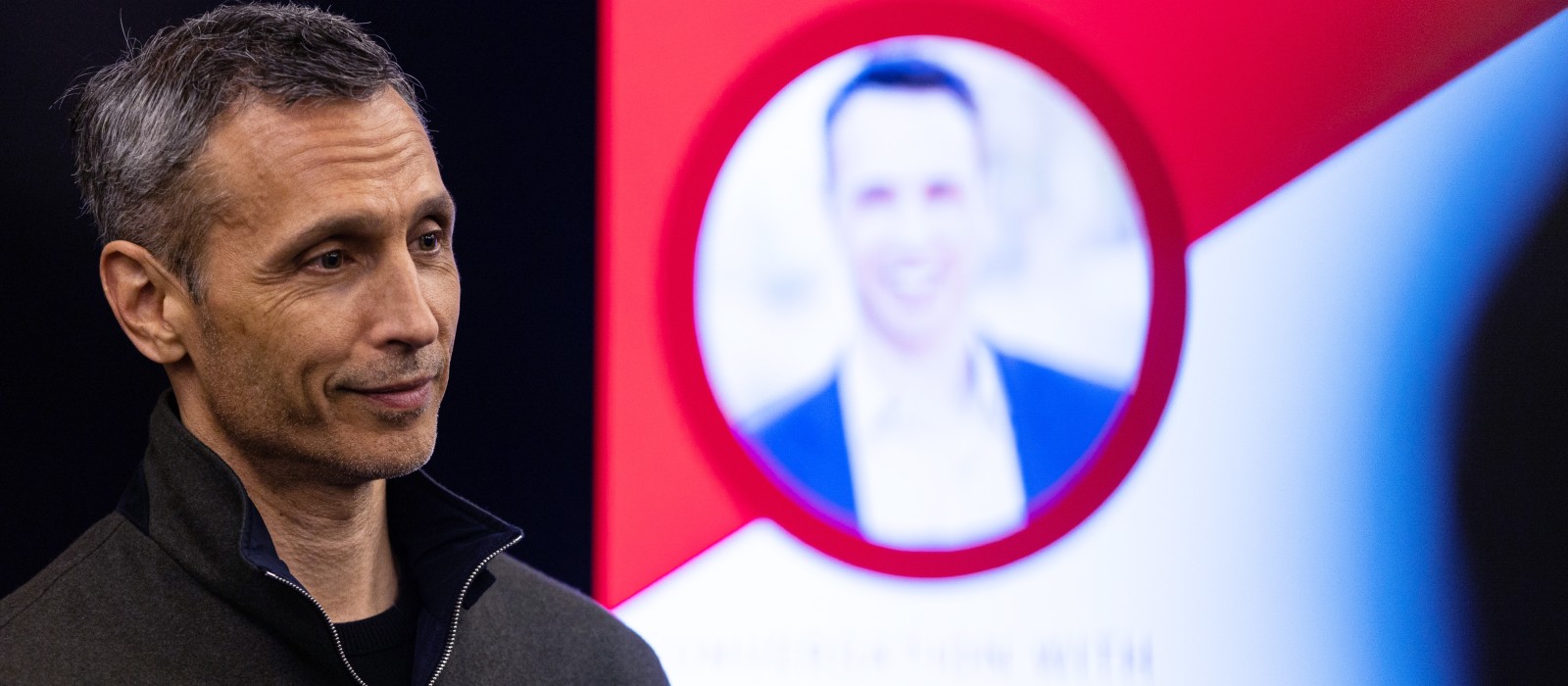Primary tabs

Despite describing his college football career as a “failure,” Jimmy Pitaro ’91 has had a lot of wins in the world of sports. He insists, however, that he’s never lost; instead he’s learned.
“I had a coach who said you either win or you learn,” said Pitaro, who played wide receiver for Big Red Football, graduated from the College of Human Ecology and now, as chairman of ESPN, leads the network’s live sports programming, as well as sports news and original and non-scripted sports-related content, for the Walt Disney Company’s cable channels, ESPN+ and ABC. “And I learned more from failure in college than I did success in high school,” Pitaro told an audience of current Cornell athletes during a visit back to campus on Nov. 9.
Coming from Edgemont High School in Scarsdale, NY, Pitaro pursued the sport and showed enough prowess to catch the attention of multiple Ivy League programs. He was recruited in his junior year by Cornell coaching legend Pete Noyes, and “fell in love with the coaches and campus,” Pitaro recounts.
Compared with a high school senior class totaling 125, Cornell felt “really, really big” for Pitaro. He found himself yearning for an “intimate environment within a large university,” and he found that home away from home in the College of Human Ecology. Part of the appeal, Pitaro adds, was CHE’s status as a state-sponsored college, which translates to more affordable tuition for New Yorkers. With an interest in business, he studied consumer economics and housing in the Department of Consumer Economics and Housing in CHE.

Pitaro (fourth row, ninth from left) and the 1989 Cornell football team
Recruited as a running back his freshman year, Pitaro was sidelined when he tore his medial meniscus and had to undergo knee surgery. He lost weight, and the team moved him to receiver. “That was not my natural position,” Pitaro said. “I struggled with it, and it just didn’t go well.” Coming from a small, close-knit town, he felt the weight of all these expectations from everyone he grew up with. “I got to Cornell, and I didn’t want to go home on Thanksgiving break. Everyone wanted to hear how I was doing, and it didn’t go well for me. I really felt like I was letting my family and my community down,” Pitaro said.
And what did I get out of that? I built some thick skin. I took failure, and I learned from it.”
I learned more from failure in college than I did success in high school.
During his second semester junior year, Pitaro decided to enroll in Cornell in Washington. He worked for the government during the day and took classes at night. One of his courses, The Holocaust and Jurisprudence, was taught by the late Neal M. Sher, considered America’s foremost Nazi hunter when he served as lead prosecutor of the Justice Department unit dedicated to tracking down former death camp guards and others suspected of war crimes.
“There were six kids in this class. And I was one of them. And it was just amazing. I was so incredulous that I got to do this and learn from this guy. He would take us out for dinner after class. He was just incredibly charismatic, incredibly smart. And he was doing something that I thought I would want to do.”
During one particular dinner between the professor and his six pupils, Sher pulled Pitaro aside and told him, “You know, you’d make a good lawyer.” It proved a profound moment for Pitaro. “At that point no one had ever told me I'd be good at anything other than sports. And I also knew at that point that I wasn't not going to be playing professional football.
Hearing him say that… that one sentence changed my life.”
And go to law school he did. Fast forward nearly 10 years, and Jimmy Pitaro, Esquire was on the West Coast, working as lead council for an internet company called Launch.com. “No exaggeration,” said Pitaro “Launch.com was Spotify, Pandora and Vevo, all three services, in the year 2000.” While in hindsight the company’s delivery of personalized, customized and on-demand radio was advanced and progressive beyond its years, “we were way too early… and because they were charging exorbitant fees to play music online, we were running out of money fast,” Pitaro said.
With the company literally down to its last two weeks of cash, Launch.com was sold to Yahoo. Pitaro became the business affairs guy for Yahoo Music. Soon after a position opened at Yahoo Sports and in what Pitaro describes as “a defining moment in my career development,” he switched over and took over the helm of one of the most important divisions of Yahoo at the time. “I woke up every day, somewhat ironically, saying we have to beat ESPN.”
Pitaro was waist-deep in uncharted waters. “I had no experience and went from managing 12 people to managing hundreds of people overnight. To say it was a stretch assignment would be an understatement,” Pitaro said of the role at Yahoo Sports. “But you work hard, you try to do things the right way, you show up, you listen, you make decisions, and you try to lead with optimism.”
“And for me, at least, when I did all those things, things started to take care of themselves.”
As part of his role, Pitaro found himself in the precarious position of managing hundreds of software engineers, having himself never written a single line of code. “There were a thousand of them wanting to hear inspirational words for me. And I’m standing up there… very challenging.”
I had a coach that said you either win or you learn.
The advantage Pitaro had was that the coders had no real connection to the strategy, the mission or the vision of the business. They were just treated as coders, Pitaro said. “And so what I started to do was bring them into it, and listen to them and give them a forum to chime in and be a part of decision making. And it was important because I built up some credibility and trust, because I knew I was never going to earn their credibility and their trust through my engineering expertise.”
There’s a saying in Hollywood for writers, Pitaro said. “Write what you know.”
And what he knew was deal-making and strategy. “So, I made them a part of that,” Pitaro said. Not only did the software engineers appreciate it, but within a couple months, “I felt like I had the engineers rowing in the same direction as me,” Pitaro said. “And then everything took care of itself.”
A year-and-a-half later, Pitaro woke up one morning to the latest comScore numbers for October: Yahoo Sports was number one… and ESPN was number two. “Once we were the number one sports and digital destination, we never took our foot off the gas,” Pitaro said. “That got the attention of some people at ESPN and Disney.”

Jimmy Pitaro ’91 listening to student athlete's question on ESPN and sports media sphere
Then, in early 2010, Sheryl Sandberg, a friend of Pitaro’s from his Launch.com days, set up a meeting between Pitaro and Bog Iger, CEO of the Walt Disney Company. Pitaro was eventually persuaded to leave Yahoo and join Disney, leading the Disney Interactive segment. And when the decision was made to consolidate two of the company’s five segments at the time, Disney Interactive and Consumer Products, he was put in charge of the new division. Despite being unfamiliar with consumer products, Pitaro once again found his footing and excelled.
All the while, during his annual review with Iger, Pitaro was always asked: “what are you most passionate about? “Without hesitation, I would say sports. Sports have been the soundtrack of my life.” In December 2017, the top position at ESPN opened, and Iger called Pitaro. “I’m assuming you’re interested in the job?“ Yes, Pitaro said. “Alright. Let’s start the process."
I woke up every day, somewhat ironically, saying we have to beat ESPN.
At this point he’d been working for Iger for seven years. “That will tell you how important ESPN is to the Walt Disney Company,” Pitaro explained. “They did not hand me the job.”
Pitaro then began what would become a grueling interview process. Between December and February, he had six interviews with his boss, Iger. In addition, he had interviews with several members of the Disney board of directors, as well as interviews with the corporate team.
“Every single weekend, I would go for a hike with my wife and our two dogs. And my wife would mock interview me. And by the time they offered it to me, I was so exhausted.”
Pitaro was offered the job in February 2018. And the first town hall he led was only a couple of days after he was offered the job. Again, he was talking to thousands of people. Except this time around it was 6,000 people, most of whom had grown up at ESPN, Pitaro explains.
“Here I am, again, in front of people feeling like I didn't grow up here. In fact, I competed against you all for many years. I woke up every day wanting to beat you all. And here I am,” Pitaro said. The intensity of the interview process turned out to be the advantage he needed.
“I was so well prepared for that first town hall, because I had spent three months trying to crystallize my vision, my strategy… so I got up there and I felt confident. I felt like I was passionate about the path forward for ESPN. So, I did it. I think it went relatively well.”
Pitaro’s oversight of ESPN includes, of course, digital strategy, encompassing ESPN.com, the ESPN app, fantasy football, direct to consumer (ESPN+), plus all the work ESPN is doing on social channels. “We're the number one media brand in the world on social. Across Twitter, Snapchat, Instagram, we're number one… not just the top sports brand, we're the number one media brand in the world on social. We take a lot of pride in it.”
One example of Pitaro’s leadership and vision can be seen on Sunday Night Baseball on ESPN. The company is investing lots of resources into creating a more relevant experience for younger audiences, giving viewers more access to content and even better, more access to athletes.
“Now you have a player on the field with a mic on, speaking live, in a game that counts, with our booth. That was a five-year project for me personally, but we finally got baseball and the players’ union to sign off on this,” Pitaro said. “And it’s going great.”
Quality storytelling, behind-the-scenes content, and not just X's and O's, is the future for ESPN, Pitaro said.
Sports have been the soundtrack of my life.
Thinking back on his sports days, what does Jimmy Pitaro miss the most? “The huddle.”
“I miss being there right beside everyone and seeing the eyes of my teammates. I miss triple sessions in August, full pads, 100-degree weather. We were in it together… it was misery, but we got through it. And now fast forward to November and you're looking at these guys, and you feel that connection, that bond, right? I miss that. I miss being part of a team.”
The lessons he learned as an athlete are as present as ever in Pitaro’s professional life. “I try to bring that team environment to ESPN, or pretty much every job that I've been in. Looking back, I think the single biggest thing I've learned is that failures are okay. Life goes on.”
“You learn from it. And you try to improve.”